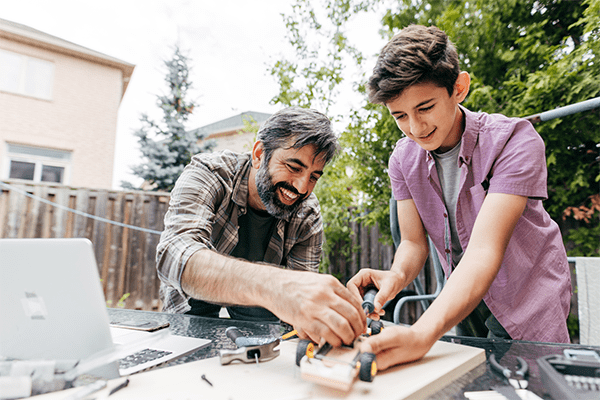Teaching Kids a Growth Mindset
Strategies for co-parents to help children develop a growth mindset rather than a fixed one.
- 5 min read
- child development
- guest author

Teaching kids a growth mindset in a co-parenting context involves both parents working together to promote a belief in the child that their abilities and intelligence can be developed through hard work. In this article, we will discuss how you can work with your co-parent to teach your kids a growth mindset.
Understanding a growth mindset
Many parents instinctively want to solve their child’s problems for them to protect them from discomfort or failure. However, allowing children to face challenges independently is important for their personal growth.
Definition of growth mindset
A growth mindset is the belief that abilities and intelligence can be developed through dedication, hard work, and learning from experiences. It involves embracing challenges, valuing effort, and viewing setbacks and constructive criticism as opportunities for growth. This approach helps children become more resilient and persistent and promotes continuous growth and success.
On the other hand, a fixed mindset refers to the belief that personal qualities like intelligence and abilities are static and cannot be changed. Children with a fixed mindset tend to believe that they are born with a certain level of intelligence or talent, and this cannot be changed by effort or learning. As a result, they may avoid challenges, feel threatened by the success of others, and see setbacks as evidence of their limitations rather than growth opportunities.
The importance of growth mindset in children
Promoting a growth mindset helps children develop confidence, resilience, and a positive attitude toward learning, which sets a strong foundation for their academic and personal growth. Professionals agree that a positive mindset can be taught, as evidenced by research showing that children who receive effort-based praise from their parents develop positive mindsets.
These mindsets help children see abilities as improvable through hard work, benefiting their academic and health outcomes. Research in the journal JAMA Pediatrics has discovered that children with Type I diabetes who believe that their health can’t improve, tend to have increased glucose levels, compared to kids who have a growth mindset. A growth mindset can provide children with several benefits, including motivation for lifelong learning, higher self-esteem, and the ability to focus on potential and possibility.

Practical tips and strategies for fostering a growth mindset
As a parent, your mindset can affect your children. A 2022 study looked at how parents’ growth mindset beliefs influence elementary school-aged children’s persistence and academic skills.
Findings have shown that children are more persistent when their parents have a growth mindset. This suggests that parents’ beliefs about the malleability of abilities can significantly impact their children’s motivation and effort. Teachers have also observed that students are more capable readers when their parents promote a growth mindset.
Below are practical tips and strategies to teach your kids a growth mindset:
Encouraging effort over outcome
Teaching children to focus on effort over outcome encourages them to focus on the learning process. When you praise their effort, it motivates them to find joy in the process rather than relying on external validation for their accomplishments.
By recognizing and rewarding effort, children are more likely to persist through difficulties. When they know that effort is valued over outcome, they feel less pressure to be perfect and more freedom to take risks and make mistakes.
To encourage effort over the outcome, you can implement the following strategies:
- Focus your praise on the effort and dedication your child puts into their task. For example, you can say, “I’m proud of how you worked on your project.”
- Celebrate their progress, no matter how small.
- Provide constructive feedback by emphasizing what they did well, and how they can do better.
Embracing challenges and learning from mistakes
Challenges are part of learning and growth, and everyone encounters difficulties. Instead of looking at these as a sign to give up, teach children that these challenges are opportunities to improve and become stronger.
Promote the idea of trying new things, even if they seem difficult or daunting. Reassure children that it’s okay to step out of their comfort zone and take risks in their learning journey.
It’s also important to reframe mistakes as learning opportunities. Emphasize that mistakes provide important feedback on what doesn’t work and guide them toward what might work better.
Create an environment where mistakes are openly discussed without judgment. Share your own mistakes and what you learned from them, showing that everyone makes errors and can learn from them.

Promoting curiosity and a love for learning
Children are naturally curious, and you can encourage this because love for learning is an important component of having a growth mindset. One way to do this is to promote an environment where they can feel comfortable asking questions.
Support children in exploring topics and activities that interest them. Provide resources such as books, experiments, and educational outings that align with their passions.
Make learning enjoyable by incorporating play and fun activities. Use games, interactive activities, and creative projects to teach new concepts and skills.
Co-parenting strategies to foster a growth mindset
Co-parents play an important role in shaping their children’s mindset towards learning and growth. By collaborating to teach and reinforce this mindset, you empower your children to approach challenges with confidence and develop into resilient, self-motivated individuals.
Consistent messaging between co-parents
Send the same messages about the importance of effort and learning from mistakes. This consistency helps your children understand these ideas better because they hear them from both mom and dad.
It’s like learning something important that you remember well because everyone around you agrees on it. When children get this kind of consistent support, they’re more likely to believe in themselves and keep trying even when things are hard. This helps them learn better and feel more confident in facing challenges as they grow up.
Creating a supportive environment
When both parents work together to encourage a growth mindset, you are helping each other out as a team. Supporting each other means agreeing on ways to help your children see that effort and learning are important.
When there is a supportive environment, teaching kids becomes easier and more effective. It creates a positive atmosphere where kids feel encouraged to learn and grow, knowing that both their mom and dad believe in them.

Collaborative activities and learning opportunities
There are plenty of activities you can do with children as part of your co-parenting activities so they can develop a more positive mindset.
One of these growth mindset activities is the “Negative to Positive” activity. On a worksheet, ask your child to write down the negative thoughts they have about a situation and the positive thoughts they can have instead. This exercise encourages children to reframe negative statements to be more positive.
Another activity is “What I Like About Myself.” Instruct your child to write or draw self-affirming statements. These can be put up in the mirror, so they will be reminded of their positive qualities.
Developing a growth mindset doesn’t have to be difficult for children, because these activities can make the process more fun for them. You can model a growth mindset through your participation and attitudes during these activities. Children learn by observing their parents’ behaviors, making it more likely they will adopt similar approaches.
Addressing common challenges
It’s normal to face challenges when teaching kids a growth mindset. For instance, children might be confused when their parents are not aligned in their approach. Parenting styles might affect this, as one parent might be more focused on outcomes while the other emphasizes effort. There might also be communication barriers that cause misunderstanding.
This is why it is important to communicate with your co-parent. Work together to blend both parenting styles, align expectations, and regularly discuss and agree on strategies to ensure consistency. Moreover, find the right balance between praising effort and providing constructive criticism. Over-praising can lead to complacency while too much criticism can effectively discourage children.
Your child’s growth mindset starts with you
Children copy what their parents do, so this means that modeling a growth mindset is key to helping them develop this thought pattern. Try out the strategies above, be consistent, and in time, your kids will have a more resilient mindset that can help them throughout their lives